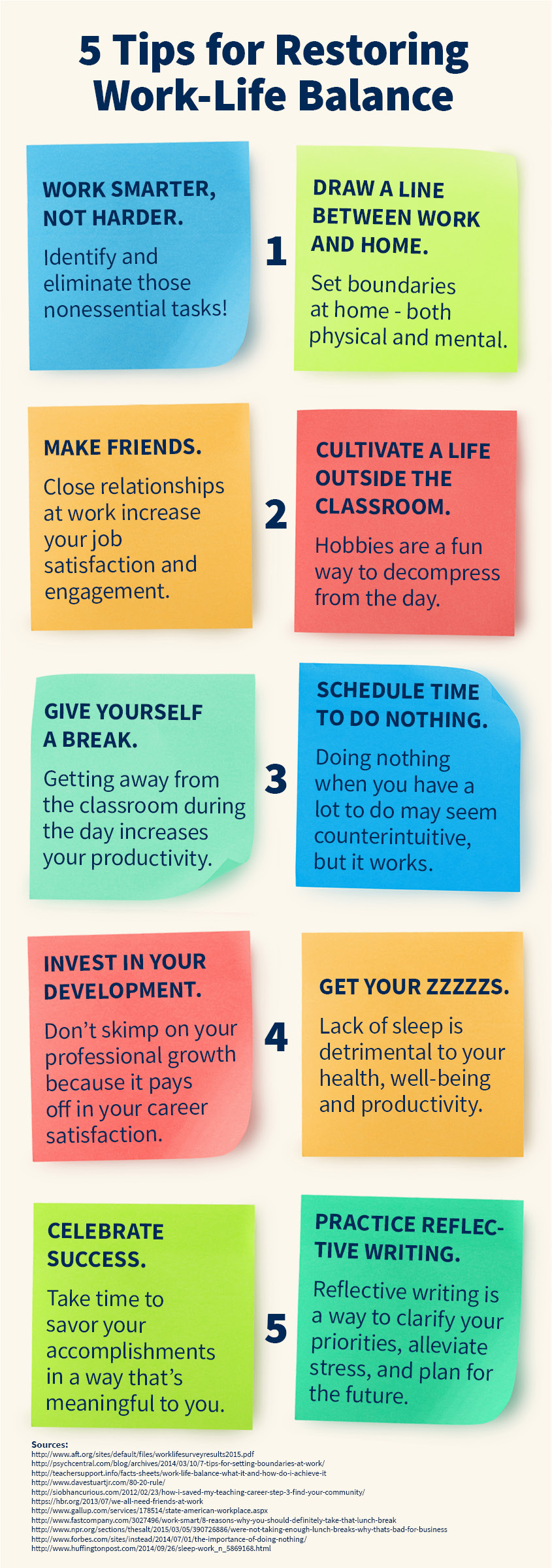
Teachers are stressed. Almost three-quarters of teachers (73 percent) report they often find work stressful. As a result, they’re more likely to leave work physically and emotionally exhausted and to bring work home. A teacher who fails to strike a balance between work and private life risks becoming burned out.
Our team is here to help! We compiled a list of tips to help teachers not only cope with the daily demands on their time but also to enjoy more satisfying lives. As a bonus, we created a fun infographic to remind you about the importance of work-life balance. Read on, and feel free to share with your fellow teachers!
Work
Work smarter, not harder
Identify and eliminate those nonessential tasks. One way to do this is to apply the Pareto principle, or the 80/20 rule, to your workday. Vilfredo Pareto was an economist who theorized we get 80 percent of results from 20 percent of the work we do. Educator Dave Stuart Jr. breaks the 80/20 rule for teachers as: “80 percent of student achievement results flow from 20 percent of the work we do with students.” Stuart recommends consolidating the time spent responding to emails, doing minimal paperwork and not worrying about creating elaborate bulletin boards, as ways to cut down on nonessential tasks.
Make friends
Close relationships at work increase your job satisfaction and engagement. Remember you’re not the only one who feels stressed at work. Talking with colleagues whom you can vent with, ask for help from or share a laugh with can do wonders for your well-being. A Gallup study found close relationships at work boosts employee satisfaction by 50 percent, and people with a best friend at work are seven times more likely to be fully engaged in their work. If you don’t have a workplace buddy, don’t be shy. Strike up a conversation with another teacher and see if you have shared interests.
Give yourself a break
Getting away from the classroom during the day increases your productivity. And no, we’re not talking about eating your turkey sandwich at your desk between classes. The operative word in the phrase “lunch break” is “break.” Getting away from the classroom, even if it’s just for a few minutes, can help you be more creative. Taking a walk around the block has been shown to boost your productivity, and taking a walk in nature is even better. Being in nature is the most effective way to relax your brain and refresh your senses, so head to the nearest park if possible.
Invest in your development
Don’t skimp on your professional growth because it pays off in your career satisfaction. Stay updated on the latest research in learning and educational technologies by setting aside time to read your favorite publications. Join a professional association and attend local meetings, when possible. If you’re more introverted, consider volunteering in one of the positions to give you a “job” and reason to reach out to others. Attend conferences that interest you in order to expand your knowledge and network with other educators.
Celebrate accomplishments
Take time to savor your success in a way that’s meaningful to you. Teachers who merely leap from task to task without recognizing the value of their achievements can become burnt out and find their work unrewarding. Educator Adriane Mingo says self-reward for achievement is an important aspect of goal setting and accomplishment. These rewards could take such simple forms as ice cream or a movie after work, so long as the teacher takes the time to savor a job well done.
Life
Draw a line between work and home
Set boundaries at home — both physical and mental. If you do need to bring work home, make sure you have an office or a designated working area that you can close the door on. Don’t check email after a certain hour to ensure that you have uninterrupted time with your family. And have one day a week where you’re completely offline in order to disconnect from stress.
Cultivate a life outside the classroom
Hobbies are a fun way to decompress from the day. Start or reconnect with a favorite hobby like gardening, photography, knitting or salsa dancing. It doesn’t matter if it’s skydiving or stamp collecting, as long as it’s an activity that lets you forget about the classroom and remember who you are as an individual.
Schedule time to do nothing
Doing nothing when you have a lot to do may seem counterintuitive, but it works. This might be especially difficult to do when you feel overwhelmed with planning lessons and grading papers. Resist the urge to do it, or rather, don’t do it anyway. Most of us feel guilty when we aren’t doing something, even on the weekends. So we check our Facebook feed or our email or jump on Pinterest for a few hours. Researchers say distraction-inducing behaviors such as checking our phones stimulates dopamine production and it feels good. The downside is we lose connection with ourselves. So if you absolutely must do something, practice mindfulness meditation.
Get your ZZZZZs
Lack of sleep is detrimental to your health, well-being and productivity. Make sure you get enough sleep each night. Aside from the health benefits, getting sufficient sleep protects you from reaching job burnout. Lack of sleep is a $63 billion hit to the U.S. economy each year due to lost productivity. Sleep helps you to better recover from stress and improves your working memory, which affects your ability to problem-solve and make decisions. The more stressed out you are, the more sleep you need each night to adequately recover.
Practice reflective writing
Reflective writing is a way to clarify your priorities, alleviate stress and plan for the future. You may have learned this technique during your teacher training, and if so, now is the time to bring it back out of your toolbox. Reflective writing helps you be more in touch with your emotional responses to situations. As a teacher, you can be frustrated with the lack of control over the curriculum, combined with the pressure to raise test scores. Reflective writing is a way to alleviate the stress of competing demands by clarifying your priorities and helping you plan for the future. Overall, this technique helps you to connect with why you teach.
Remote balance
Work-life balance during remote work era presents its own set of challenges. Being on the computer for most of the day in a home environment is very different than within an office setting. Unless barriers are established, work and home can blur into each other. This article by Fingerprint For Success presents some tips for creating balance during distance working.

